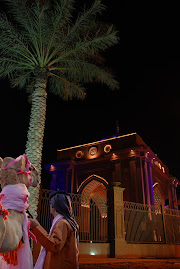A recent story 'Minuets, Sonatas and Politics in the West Bank' published in the New York Times about the flourishing classical music culture in the Palestinian territories, especially in the West Bank, reminded me of the late Dr Edward Said and the orchestra he set up with Israeli conductor and pianist, Daniel Barenboim (more on that in just a bit).
For the Palestinians living in the West Bank, music may be a form of escapism from the harsh realities of living under an unforgiving Israeli occupation. And while nothing is comparable to the life of checkpoints, identity cards and statelessness, I -myself- understand how music can become a means to escape to an alternative universe, a better place during downtrodden times.
I played the piano for almost seven years. Despite that, I am too ashamed to call myself a pianist. For starters, I haven't touched the keys of my Yamaha piano in months, and even when I do manage to haul myself onto the piano bench, I frustratingly stare at my notes for minutes on hand, trying to train my fingers to simultaneously work with my brain in order to produce...music.
Sometimes I succeed, thanks, mostly, to my habit of memorizing the pieces I used to play in the past. But other times I fail miserably with more complex pieces, and walk away from the wooden musical instrument in bitter defeat.
That said, I am still a firm believer in the power of music. In it's ability to bridge the divide of disconnected worlds ..Of making sense of the vast differences in realities, like that of the Palestinians and Israelis.
Before his death in 2003, Dr Edward Said co-founded an Arab-Israeli orchestra for the region's youth, along with Daniel Barenhoim, an Argentine-born Israeli conductor and pianist.
The Palestinian American intellectual and activist and his Israeli music partner envisioned a collaboration that could bring the two 'enemies' together, and provide them a platform where they could produce something productive together. Something other than the unrelenting cycle of violence that has marred both their lives for too long.
Unfortunately, even with a means as "neutral" as music, the orchestra has created controversy in places where the musicians performed.
Many critics said such a collaboration is merely a way to detract from the inherent issue of justice and statehood for the Palestinians, however, those who are familiar with Dr Said's efforts for the Palestinian cause will know just how adamant he was about securing justice for his comrades in the West Bank and Gaza.
Even Borenhoim, the Israeli conductor who is still managing the orchestra after Edward Said's death has consistently stated that music is not enough. It is only a way for both peoples to realize the humanity of the other.
Watch this very interesting video, where Frost interviews Borenhoim on Al Jazeera English. They touch on topics such as the orchestra, his vision for justice, and his thoughts on the conflict.
Some memorable excerpts from the interview:
-On the destinies of the Palestinians and Israelis:
"I believe very strongly that the destinies of the Palestinian and Israeli peoples are intrinsically linked, and there is no military solution to the problem."
-What what the orchestra can teach you:
"To play in an orchestra is a lesson for life...You have to play your part with upmost conviction and passion but you also have to have an ear to what I am playing simultaniously to you."
(NB: (Perhaps every politician should perform in an orchestra at some point in his/her life, pre-politics)
-On whether he will see a Palestinian state in his lifetime:
"If we don't see a solid Palestinian state, we will not see Israel for much longer."
-On building walls, both figuratively speaking and otherwise:
"Basic understanding is that you can't put up walls, borders to seperate the people.
People who want to do violence will do so with or without the walls."
曼联官方:C罗被评为2021-22赛季俱乐部最佳球员
3 years ago


No comments:
Post a Comment